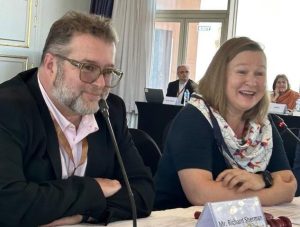The Transitional Committee on the Loss and Damage Fund is meeting for the fifth time this year as pressure mounts for countries to agree on unresolved issues around the Fund’s design so it can be tabled at COP28 and start work

With the annual UN climate talks, COP28, just weeks away, speakers on a media briefing organised by Climate Action Network on Thursday, November 1, 2023, laid out why a fifth session of the Transitional Committee (TC5) on the Loss and Damage Fund, starting on Thursday, will be critical to deliver an agreement on key elements of the Fund’s functioning such as its governance, location and sources of funding.
The divergences between developed and developing countries have come to a boil particularly on issues around contributors to the fund, the location/host institute of the fund and its governance structures.
Rich nations such as the United States have called for all countries to contribute equally to the capitalisation of the fund thereby erasing any semblance of equity and historical responsibility in who must give the most. They have also pushed for the Fund to be hosted by the World Bank which will restrict its independence, prove more costly, and limit its capacity to disburse funds on time as the urgency of extreme weather events escalates.
In a previous briefing (passcode: 6ZR#18^+), the G77+ China chair, Ambassador Pedro L. Pedroso Cuesta, had made it clear that all these demands are untenable for developing countries. He reiterated that the Fund must stand independent and hosted under the UN Climate body and rich nations must lead with their fair share of funding it under agreed principles enshrined in the Paris Agreement on Common but Differentiated Responsibility (CBDR).
According to observers, the talks that started on Thursday need to find a compromise with countries able to agree on all these outstanding issues so a draft proposal can be submitted at the upcoming COP28, and the Fund can start working as soon as possible.
Harjeet Singh, Head of Global Political Strategy, Climate Action Network International, said: “The upcoming meeting is a ‘make-or-break moment’ that will determine the success or failure of the new Loss and Damage Fund. For too long, wealthy nations have hidden behind excuses, delaying necessary action and leaving vulnerable communities to bear the brunt of climate impacts.
“Rich countries, the US in particular, must abandon their push for the World Bank to host the Loss and Damage Fund. Instead, they should engage constructively and work to design a fund that is nimble, scalable, and ready to meet the immediate and future needs of vulnerable communities.
“The clock is ticking. We must bridge the trust gap, operationalize the fund, and provide the necessary support to those who need it most. We cannot afford to fail, as the lives and livelihoods of millions are at stake.”
Brandon Wu, Director of Policy & Campaigns, ActionAid USA: “The location of the Loss and Damage Fund continues to be a sticky issue. The World Bank continues to be supported by developed countries as the host, however it is unacceptable due to their governance structure, issues around access to funds, their involvement in global debt, and their fees, all of which are disqualifying factors.
“Even as an interim option, the Bank is a dangerous one, once established it would be very difficult to set up an alternative bureaucratic process and would likely be too difficult to reverse.
“Further delay has been caused by the extreme position taken by the US which has derailed talks, their refusal to incorporate historical responsibility and principles of equity is frankly unreasonable.”
Isatis M. Cintron Rodriguez, Director Climate Trace Puerto Rico/ACE Observatory: “This fifth Transitional Committee meeting must be bold. We don’t have time to get it wrong. We need a fund that is fit and ready to deliver justice for communities harmed by the climate crisis and debt crisis. Wealthy countries must come ready to adequately address the losses and damages caused by their historical inaction. This means a standalone participatory fund, designed by those in the most vulnerable situations -including developing countries and civil society representatives, guaranteeing direct access for frontline communities.”
Lien Vandamme, Senior Campaigner, CIEL: “The establishment of the Loss and Damage Fund at COP27 was hailed as a historic win for communities who are facing harms caused by decades of delay of climate action. But it is yet to be seen whether justice will prevail. The focus of these talks should be on delivering a Loss and Damage Fund that meets the needs and priorities of communities and people and respects and fulfils their human rights.
“In spite of this, developed countries have persisted in making unjust proposals about the governance and the structure for this Fund, such as setting it up under the World Bank, and continue to deny their responsibility to pay for the loss and damage caused by their climate inaction. This is inexcusable and only a drastic change in wealthy nations’ approach to these talks will allow for the fifth meeting to achieve what the fourth couldn’t. A failure to deliver will not make the communities whose rights are at stake and who are entitled to remedy go away, to the contrary.”
